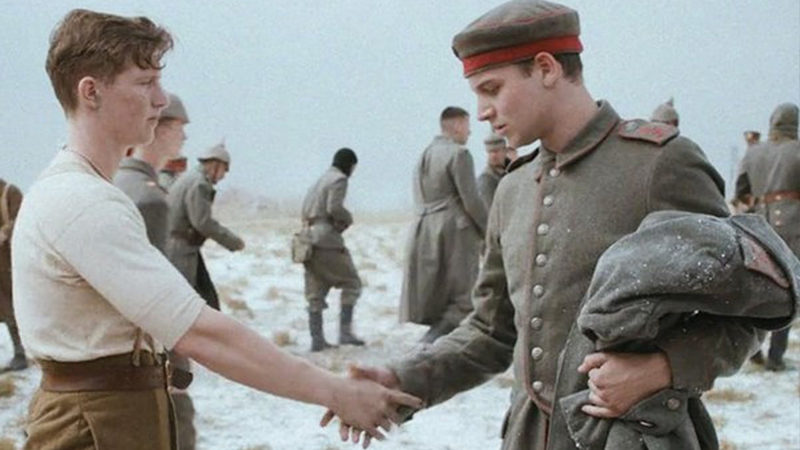Judge Jalal :
Ladies and gentlemen of the jury. You are about to view a video produced by the British supermarket giant Sainsbury’s reflecting the events of the Christmas Truce that took place between British and German soldiers in World War One.
At issue here is the chocolate bar which makes its appearance at about the 15 second mark. Sainsbury’s has remade these chocolate bars and is selling them for one pound sterling. Half of the proceeds of each bar of chocolate will go to the Royal British Legion charity, while the other half goes to Sainsbury’s.
jury will look at the video and decide whether this is nothing more than a shameful piece of advertising by Sainsbury’s primarily to make a profit or whether this is a moving and fitting commemoration of a little known moment of compassion and humanity in what was a horrific and devastating war.
Prosecutor Jalal :
It is shameful that such a wondrous event has been unscrupulously hijacked by the disingenuous Sainsbury’s and despicably used to encourage us to innocently purchase their contemptible chocolate bars. I wager that some obnoxious, unctuous, money-grubbing ad man has been handsomely rewarded for his distinct lack of principles.
It is nothing more than a clever marketing gimmick intended to deceive the public into thinking they are helping a charity.
You will note that the chocolate bars themselves sell for one pound, yet the British Legion only gets a half of it. The rest finds its way into the wide and very deep pockets of Sainsbury’s.
Not only that, but by attracting customers into their stores to buy their chocolate bars, Sainsbury’s will also boost its profits through subsidiary sales of other goods.
Finally, it is disgraceful that an important and poignant event such as the First World War Christmas Truce should be used to sell any product at all.
It’s both disgusting and abhorrent to callously exploit the memory of those men who perished in such a horrific war for the sake of profit.
Judge Jalal:
Thank you, Prosecutor Jalal. Now will Defendant Jalal state the case for the Defense.
Defendant Jalal:
My learned opponent, or possibly not so learned, has claimed that Sainsbury’s should not have taken an event such as the Christmas Truce and used it as an excuse to make money. Basically, one should not make a profit from suffering.
My learned friend has used the words disgusting, abhorrent, disingenuous, and shameful to describe Sainsbury’s actions.
I would use only one word to describe Sainsbury’s motives, “Honorable.”
The advert shows an actual event not exactly well known in the United Kingdom, let alone in the rest of the world, which took place 100 years ago. It shows a moment of compassion, humanity, and peace in the middle of a horrific war. Sainsbury’s has brought this poignant moment in human history to the attention of millions of people who were ignorant and unaware of it before.
My learned opponent has also excoriated Sainsbury’s, claiming the advert was made primarily for profit and not charity. It is true that only half of the cost of the chocolate bar will go to charity. But where does the other half go? Chocolate bars do not magically appear with the words abracadabra, they have to be made. For their 50 pence, Sainsbury’s have to manufacture the chocolate, wrap it in the authentic 1914 wrapping paper, distribute it to stores all over the country and advertise it on billboards and television. These production costs are going to drastically reduce or wipe out any supposed profit.
As for the subsidiary sales argument, Sainsbury’s is not forcing the general public to buy any other of its goods. People will generally buy things according to quality, price, and convenience. I dismiss the ridiculous claims of the prosecution as totally absurd.
The idea that Sainsbury’s is exploiting the Christmas Truce for profit is a heinous accusation, casting the company as a pariah of society. However, my learned opponent is correct in that there has been exploitation, but this has nothing to do with Sainsbury’s.
In 1914, plum puddings were sent to the troops at the front by the Daily Mail newspaper, chocolate came from Cadbury’s, and butterscotch from Callard and Bowser. For 15 shillings, so advertisements in British newspapers at the time read, you could send the Tommy at the front a thousand gold flake cigarettes.
So private enterprise as early as 1914 had already seen the potential of making a profit out of the war, but were they criticized? No!
Another egregious example of making a profit out of the Christmas Truce comes with Paul McCartney’s Pipes of Peace song and video from December 1983. It shows a version of the truce similar to Sainsbury’s advert. The song reached #1 in the British music charts and made a lot of money for Paul McCartney. No money went to charity. So why weren’t the same accusations hurled at Paul McCartney? Is it because he was one of the Beatles?
Is it even right to criticize Sainsbury’s for supposed profiteering when other entities have been doing it for the past 100 years?
The Christmas Truce of 1914 was a spontaneous act of humanity that transcended war. I want you to look again at the Sainsbury’s video and I will leave you with one issue to ponder. Is this an example of shameless exploitation or a sensitive portrayal of a genuine, wondrous event?
I place Sainsbury’s reputation in your hands.
Judge Jalal
You, viewers of this video, are the jury. Do you agree with the Prosecution or do you agree with the Defense? Please vote in the comments section of this article.

